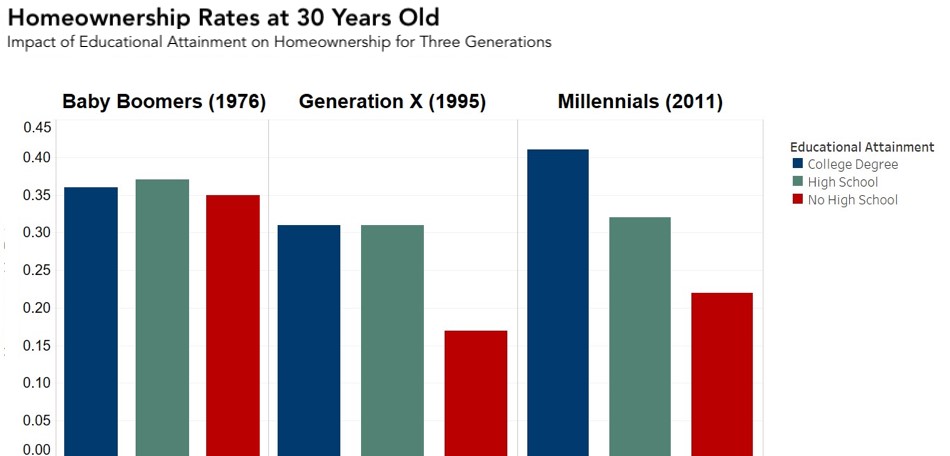Whether students are beginning middle school or their last year of college, back-to-school season is here. Although many students may grimace when they hear “back to school,” they won’t regret pursuing a higher education as adults as they compete for well-paying jobs and one day, hopefully, buy a home.
"Although millennials may delay buying their first home longer than prior generations, those that invested in a higher education are far more likely to realize the return on their great investment – purchasing their first home."
Millennials, many of which are recent college graduates and newcomers to the professional world, are the most educated generation in American history. According to PEW Research, only 22 percent of men and 20 percent of women baby boomers between the ages of 21-36 years old had earned their bachelor’s degree. For millennials in 2017, 29 percent of men and 36 percent of women between the ages of 21-36 years old have already earned a bachelor’s degree or higher.
As millennials have pursued higher education, they have been less focused on settling down, marrying and starting a family – all critical lifestyle choices that influence the decision to become a homeowner. However, when it comes time for millennials to put down roots, they will not regret investing the time and resources to earn that degree.
Investment in Higher Education = Greater Earning Power
Student debt can be a burden, and the price of college may seem intimidating, but the cost of not going to college—in the long run—is likely to be more. Brookings Institution research found that the average 50-year-old with a college degree earns about $46,500 more annually than the average person with just a high school degree. As older millennials enter prime home-buying age, the enhanced earning power made possible by their higher education levels provide them with the additional house-buying power necessary to become homeowners.
Homeownership Gap Widens for Those Without a Degree
First American’s Homeownership Progress Index (HPRI), which measures how a variety of lifestyle, societal and economic factors influence homeownership rates over time, highlights the strong and growing correlation between higher education and homeownership, finding the impact of education in relation to homeownership has nearly doubled in 10 years. In 1997, the difference in the homeownership rate between those without a high school degree and those with a college degree was 11 percent. By 2016, this gap had widened to 21.3 percent, before declining modestly to 20.5 percent in 2017.
Comparing different generations, baby boomers, generation X and millennials, each as they enter prime home-buying years at age 30, reinforces how the importance of education for homeownership has increased intergenerationally. While less educated baby boomers were still nearly as likely to become homeowners as baby boomers with degrees, the homeownership gap for those without higher education has increased for subsequent generations. In 2011, when the oldest millennials turned 30 years old, 41 percent of millennials with a college degree were homeowners, compared to only 22 percent for those without a high school degree. Higher education leads to higher income levels, significantly improving the likelihood that one can afford homeownership.

Homeownership – the ROI of Higher Education?
Overall, 9 out of 10 millennials believe earning their college degree was worthwhile and have already paid off their student debt or will in the future. Although millennials may delay buying their first home longer than prior generations, those that invested in a higher education are far more likely to realize the return on their great investment – purchasing their first home.
Katherine Hayden contributed to this blog post.



